 I wanted to thank everyone who sent in a first page this month. I read through everything that was sent in and I was very impressed with the quality of the submissions. Unfortunately, I could only send in four pages to agent Rachel Orr, so I put everyone’s name in a hat and pull out four names. I hope you will send in the same on or something else for February.
I wanted to thank everyone who sent in a first page this month. I read through everything that was sent in and I was very impressed with the quality of the submissions. Unfortunately, I could only send in four pages to agent Rachel Orr, so I put everyone’s name in a hat and pull out four names. I hope you will send in the same on or something else for February.
Here are the four winners and Rachel:
CAUGHT by Amanda Worlley – YA novel
Jake was half way down the car park ramp when he heard the scream. It was a man’s guttural cry, thick with pain. A chill swept through Jake’s body and he stopped running. As he turned back towards the wail he felt another shudder, this time of relief, as his two friends came rushing towards him.
‘Run,’ said Timmo, as he bolted past Jake. The screaming was unrelenting as security guards reached the top of the ramp, yelling at Jake to stop. Those few seconds had cost him a lot of ground. He turned, launching himself in the same direction his friends had gone. Reaching the landing where the ramp turned to the right leading down to ground level, he spied two more guards charging up the rise towards him.
Without hesitation, he dived towards the concrete barrier shielding the three metre drop to the level below. His heart was pounding as he reached forward placing his palms squarely on the cool surface, and brought his knees up to his chest to clear the wall. As his legs swung through, he pushed off with both hands and held his breath as he dropped to the floor below. He touched first with the balls of his feet and then bent his legs to help absorb the impact, letting the air escape from his lungs. Jake let his body collapse and rolled, the momentum allowing his feet to find ground and propel him forward. He was grateful for the practice he had put in to perfect that roll. Guards leant over the barrier above and called to the dark haired boy to stop.
The fresh night air rushed in through the car park entrance filling his nostrils, and with a surge of confidence he pulled the hood of his sweater back over his head. He ran out of the carpark and pounded along the road that led away from the shopping centre. He didn’t stop until he could no longer hear the screaming.
HERE IS RACHEL:
CAUGHT
The first line here—“Jake was halfway down the car park ramp when he heard the scream”—is terrific because it really catches the reader’s attention: Someone is in trouble. And the phrase “he felt another shudder, this time of relief” is also effective because it causes a change in the reader’s expectation: Jake wasn’t panicked simply because he thought someone was in trouble, but because he was possibly involved. Of course, given the title of the novel, Caught, the reader may sense this already, but it’s an effective line nonetheless, making the reader want more—which is what you always want to achieve in the first page of any book.
The next two paragraphs—in which the action of Jake’s escape is described—are chockfull of action and very cinematic in a sense, although I wish they were a little less play-by-play. The description of Jake’s every move (i.e. “He touched first with the balls of his feet and then bent his legs to help absorb the impact”) is actually slowing down the action instead of propelling it forward, which seems contrary to what you actually want to achieve here. I would love to see the pace of the text better match the quick pace of the scene’s action.
I felt like I was glazing over the action scenes until I reached the line “He was grateful for the practice he had put in to perfect that roll”, which really caught my attention. This must not have been an impulsive act of crime, but rather, premeditated. That’s good stuff (except for the victim, obviously ![]() . Again, it makes the reader want to keep reading. I was thrown off a bit, however, by the final sentence in this third paragraph “Guards leant over the barrier above and called to the dark haired boy to stop”. That specific reference didn’t seem necessary—“called for him to stop” would seem to suffice—unless they’re actually talking about one of Jake’s friends here. And, if that’s the case, then it would help to make that much more clear.
. Again, it makes the reader want to keep reading. I was thrown off a bit, however, by the final sentence in this third paragraph “Guards leant over the barrier above and called to the dark haired boy to stop”. That specific reference didn’t seem necessary—“called for him to stop” would seem to suffice—unless they’re actually talking about one of Jake’s friends here. And, if that’s the case, then it would help to make that much more clear.
As for the final paragraph, I love the image of Jake pulling the hood of his sweater (not a sweatshirt though?) back over his head—although it did cross my mind why he didn’t have the hood on during the crime instead of pulling it on afterward. Still, overall, this is a strong start to a novel that is sure to capture the attention of your readers and keep them engaged in the plot of the novel. Well done!
________________________________________________________________________
LEAVING KENT STATE by Sabrina Fedel – YA historical fiction
I love the idea of the opening image here: a girl waiting for an older boy to come home. I’m imagining Rachel on the stoop of her home, but would love to know if I’m right. And is Evan her neighbor? Their relationship tripped me up a bit at first; I kept thinking that he was her brother, even though you clearly have her looking for the sight of his dad’s car (not their dad’s car). Still, it might be helpful if you were clearer about their relationship sooner rather than later.
Also, I don’t think we need to focus so much on the October sun here. The fact that it’s always cold in Northeastern Ohio—but warm enough today—seems contradictory, as well as a bit untrue. I also wasn’t sure why the sun was making the construction paper feel soft and fragile in the narrator’s hands. Perhaps you could simply focus on the leaves (or something even less expected) to signify the month of October?
In addition, I had some confusion about Rachel’s age. In the first few paragraphs—with the reference to construction paper and childhood nicknames—she sounds like she could be a pre-teen. I thought that maybe she was planning her own ticker-tape parade for Evan—and that she would love to be kissed by him—which could be very sweet and innocent, although maybe not the right innocence for a YA novel. When Rachel mentions Pratt, however, it’s suddenly clear that she’s a high school student, which doesn’t seem to gel with the details we already know about her.
While it’s clear that Rachel greatly admires Evan, I wasn’t sure what to make of the reference to her wanting to “dance with outstretched arms in homage to the God of the Stars” after seeing his smile. Also, the description of his “China blue eyes” seems a bit dated here. I realize this is historical fiction, of course, but maybe hearing something about Evan that’s more specific and unique to him (as opposed to simply his eyes and his smile) would give us insight not only into what Evan is like, but also into Rachel’s character, and what kind of qualities she finds attractive in a man.
Lastly, I’m a bit concerned here about both identifying the era of this novel, as well as reader expectations. For example, I’m not sure if today’s readers will be familiar with the image of the Times Square ticker-tape parade photo. And, if they are, I worry that this might point readers to the wrong era—to World War II, instead of Vietnam. Likewise, I’m not clear on how much we’re expecting readers to know about the Kent State shooting. And does this opening scene take place before or after the shooting? Given the title, Leaving Kent State, I initially assumed that Evan was the one leaving Kent State because of the shooting—and that was why Rachel referred to the day as a “revolution”. So, naturally, I was surprised to find out that Evan was actually stationed in Vietnam, and also that Rachel’s dad wants her to go to Kent State. (So this story must begin before the shooting—and it must be “expected” because it’s close to him, yes? Although I don’t think we can expect readers to know that Kent State is in Northeastern Ohio.)
Overall, I think this is a topic that has a lot of promise, and that clarifying some important points early on in the story will keep readers engaged in the compelling story you’re trying to tell.
HERE’S RACHEL:
LEAVING KENT STATE
The October sun is always cold in Northeastern Ohio. Sitting there, waiting for Evan, it seemed warm enough, making the little pieces of colored construction paper in my hand soft and fragile. I sat on my front steps, scanning the corner for the sight of his dad’s brown Chevy Impala. Yellow maple leaves fell like random pieces of confetti, but not enough to be like that photo of the ticker-tape parade in Times Square on VJ day, the one with the sailor kissing the girl.
I imagined Evan, smiling in his way that made me want to dance with outstretched arms in homage to the God of the Stars. He would get out of the car and hug me, calling me Rachel for the first time. He won’t call me Bug now, I thought. Not after nineteen months away. He’ll see how much I’ve grown up. He won’t call me Bug today.
I had his red electric guitar, polished and in perfect condition, sitting in its case beside me. When he gave it to me to take care of, I knew he never thought I’d learn to play his favorite Beatles’ song for his homecoming. Revolution. Today was a revolution.
Evan would know how to talk my dad into letting me go to Pratt. Evan could talk my dad into anything. Maybe because my dad always wanted a boy. Maybe because Evan had a way of talking so you didn’t even know he was asking for anything. Maybe because of those China blue eyes that made you want to believe in something. Evan would know how to make my dad understand I couldn’t go to Kent State just because it was expected.
The week before, when we found out that Evan was coming home, his mom had said everything had changed. When I asked her why, she had just cried. But she was wrong. I reread every letter Evan sent me from Vietnam. Evan hadn’t changed. He hadn’t changed at all. He’d taken some shrapnel in his side so they were sending him home a few months early. It was all part of the troop withdrawal President Nixon had promised. I had read about it in the paper, how when boys were injured, they were sending them home and not replacing them.
_______________________________________________________________________
SHINING SEA by Mimi Cross – YA paranormal romance
Tuneless humming was coming from the next room. I’d always been the better singer, no secret. To me, singing feels like . . . flying.
I sang before I could talk. As a little kid, I sang in the church choir, later, in the choruses at school. Two years ago I started writing songs—not that I’d call myself a songwriter yet. My first real gig was last weekend down in the Mission District. Standing on the corner stage of the black box performance space I played one set, twelve tunes, while hipsters watched with crossed arms. Performing in front of an audience is a good way to tell if your songs are finished. Or not.
The song I was trying to capture now definitely was not. I gave the guitar a soft strum. A ghost of a chord slipped out. Playing the haunting notes a little louder, I listened for the melody. It would come eventually, but we were leaving any minute. Not just leaving. Moving.
“Do you know,” I sang softly, “where lost things go?”
No. Not right. My fingers fumbled then jerked, hitting on a rhythmic pattern atop a single, minor chord: one and two, one and two.
“Saint Anthony, can you come around? There’s something lost, and it can’t be found.”
In the next room Lilah fell silent. The lyrics tangled in my throat. Saint Anthony, was he the one? A quick Google search told me I was right, Saint Anthony is invoked as the finder of lost things. Pulling the guitar closer, I played the line over and over.
“Arion? You up there?” Dad. I shut the laptop and put the guitar in its case. Hands full, I left my room and stood in my sister’s doorway. She didn’t see me.
Lilah is beautiful. Her features are regular and in proportion. Mine are slightly, well . . . exaggerated. Nose longer, eyes wider, lips fuller.
The tears I’d vowed not to cry started to sting my eyes. Brown eyes. On a good day, they were hazel. Maybe. There’s no mistaking the color of my sister’s eyes. Bright blue. Her hair is
HERE IS RACHEL:
SHINING SEA
I like the idea of a teen songwriter as a protagonist; this felt really fresh to me. So I must admit that I was disappointed when I came to the third paragraph and realized that the protagonist was going to be moving. Maybe it’s just a pet peeve of mine, but this seems like more of a stock beginning and not the kind of hook that is going to capture your readers and keep them reading.
Also, I didn’t feel as grounded in the setting as I would have liked. In the first paragraph, we learn that there is tuneless humming coming from the next room, but we don’t get a clear sense of where, exactly, our narrator is—or who the tuneless hummer is. Not that you want to give everything away right from the beginning, of course—it’s always good to keep the reader guessing about some things, to tug them along through the course of the narration—but it’s usually helpful for a reader to at least be grounded in the setting, and also have a sense of who the characters are.
We also learn in the first paragraph that the narrator is a better singer than the tuneless hummer (which is a good thing, considering she wants to be a songwriter ![]() —and that, to her, singing feels like flying. But then, instead of getting a clear picture of what the narrator means by this comparison, we’re suddenly pulled through a flash of church choir and chorus until we arrive at the protagonist’s first gig in the Mission District. This might be an interesting place to start the novel—with a fully fleshed-out scene on this (perhaps awkward?) performance. Or, we could keep the focus on the protagonist playing her guitar (at home in her bedroom, I’m assuming?). But I would suggest choosing either one or the other as an opening scene, not both—and perhaps cutting that very first, short paragraph of three lines altogether, since it doesn’t do much to either grip the reader or set the scene.
—and that, to her, singing feels like flying. But then, instead of getting a clear picture of what the narrator means by this comparison, we’re suddenly pulled through a flash of church choir and chorus until we arrive at the protagonist’s first gig in the Mission District. This might be an interesting place to start the novel—with a fully fleshed-out scene on this (perhaps awkward?) performance. Or, we could keep the focus on the protagonist playing her guitar (at home in her bedroom, I’m assuming?). But I would suggest choosing either one or the other as an opening scene, not both—and perhaps cutting that very first, short paragraph of three lines altogether, since it doesn’t do much to either grip the reader or set the scene.
I love the lines where the narrator is fumbling around on the guitar, trying to find the right chords, and I love the lyrics she writes. However, I wasn’t as crazy about the quick Google search to make sure that Saint Anthony was the patron saint of lost things, because I felt that pulled us away too abruptly from the narrator’s creative moment. The abrupt interruption from her Dad does feel right though, and it made me hope that this would be the main conflict of the novel—that the protagonist is trying to hide her musical talents from her (presumably) disappointed father—instead of the fact that she’s moving.
Lastly, I don’t think we really need to know what Lilah looks like. Or, if we do, perhaps you could show us more subtly (instead of just coming out and telling us) that she’s more beautiful than the protagonist. And, if this is necessary, then maybe there’s a better moment to do that. Right now, at this point in the story, I don’t care if the narrator’s eyes are wider (and I especially don’t want any clichéd stinging tears). What I really want to know is where she’s planning on stashing her laptop and guitar before her dad shows up. That will keep me reading.
______________________________________________________________________________
SLED DOGS, ESKIMOS, AND DRAMS by Judy Pressler – Middle Grade Historical Fiction
“Patricia, do not stop!” I told myself, but curiosity got the best of me. I just wanted a good look at the shabby, run down house on the edge of the Alaskan tundra. I would never go inside the haunted house. Fear kept my mukluks glued to the snow covered path.
I blamed a not-so-nice classmate in my school that I stood there on the wooden boardwalk shivering in the cold. She frequently played tricks and told untrue stories. Tillie told everyone in my class she heard ghosts in the deserted house. That tempted me to check out the place. Most likely she hid somewhere to watch and laugh. I heard no ghost noises, and no one lurked behind any of the other houses or buildings.
After school on that April day, my mother sent me on an errand to my Grandmother Annun’s house. She and Grandfather Kanlak lived in the last house of the village. Their house overlooked the Kuskokwim River. The haunted house set four rows back from the river with the tundra as its backyard. On the walk to my grandparent’s home, I followed the usual path; but going home, my feet turned toward the empty house. I couldn’t resist since I was so close to it.
My ears heard an odd noise coming from the house. Ghosts? My heart pounded out-of-control. Tillie told us ghosts made a spooky sound, like howling of the wind. These ghosts didn’t howl. They sounded familiar!
I had an idea. I’d peek into one of the windows, but I would have to stand on something. Our houses had to be built off the ground on stilts because of the Arctic permafrost underneath. The yard lay cluttered with various broken items. If I pulled some of them out of the snow, I could build a tower to stand on. I stacked discarded bed springs, a washtub, and a tricycle under the window. As my eyes adjusted to the darkness inside, I slipped off my perch. In that split second, I caught a glimpse of the ghosts!
HERE’S RACHEL:
SLED DOGS, ESKIMOS, AND DRAMS
The choice of setting this story in the Alaskan tundra is very intriguing, and sets this story apart from your typical haunted house story. I’d love to see a beginning that focuses on this strength: the moment that Patricia stops in front of this haunted house on the tundra, and what the house looks like, and what she’s feeling. While it can often be effective to begin a story with a line of dialogue, I’m not sure that this particular line will really grab readers. But a description of this eerie house might.
I’m also not sure that we need to know so much about Tillie here—probably a simple line or two would suffice—and I would also suggest cutting the third paragraph entirely. It seems almost like a mini-flashback of sorts, and I don’t think it helps to advance the story at all. The explanation of Patricia needing to run an errand doesn’t seem entirely necessary—nor does a description of the location of the house.
Also, I’m curious about the description of this piece as historical fiction. During which time period does this story take place? It might be nice to work some hint of that into this opening passage as well—but in a subtle way, of course.
However, I would take a bit more time with the following two paragraphs, fleshing them out without rushing them (especially the last paragraph here). For example, how did the ghosts sound, exactly? You say “familiar” here, but what do you mean by that? In fleshing out the text though, be wary of relying on cliché phrases, such as “my heart pounded out of control”. It’s fine to include them in your first draft—do anything you can just to get the story itself down on paper (or on the computer!)—but then keep an eye out for them when you’re revising and try to eliminate as many of them as possible.
I found the very last line of this page to be especially intriguing: “In that split second, I caught a glimpse of the ghosts!” Yet I’m curious to know exactly what Patricia saw (or thought she saw, maybe?). Was it a flash of light? A white blob? What? Remember, the cardinal rule of writing is showing, not telling. And enquiring minds want to know. ![]()
Thank you Rachel for taking the time to share you expertise. I am sure everyone will get something out of reading your comments. I know I appreciate you being our Guest Critiquer very much.
Talk tomorrow,
Kathy
Filed under: authors and illustrators, demystify, inspiration, Process, revisions, Writing Tips Tagged: Agent Rachel Orr, First Page Critiques, Prospect Agency



 Erin Murphy,
Erin Murphy,  Ammi-Joan Paquette,
Ammi-Joan Paquette,  Jennifer Laughran,
Jennifer Laughran,  Teresa Kietlinski,
Teresa Kietlinski, 

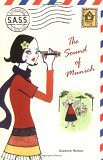
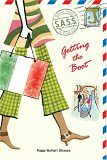
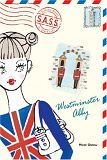
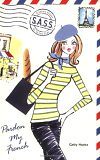
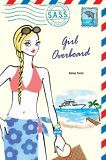
Thanks, Kathy. These critiques are so helpful to all of us, especially by someone like Rachel.
Thank you, Rachel for taking time to share these critiques and for offering this great opportunity for learning. Thank you, Kathleen for working with Rachel to make this happen.